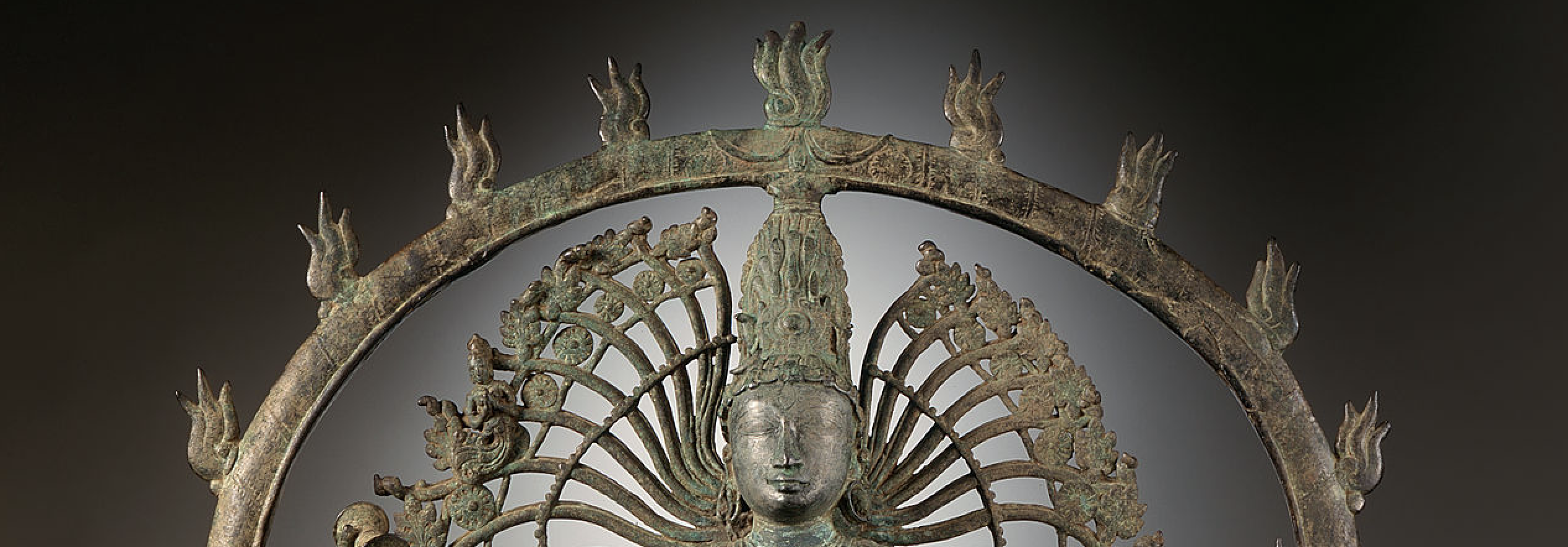
HISTORY OF INDIAN PHILOSOPHY
Philosophy 300
Fall 2023 Syllabus
Section 001
CRN: 13694
MW 12:00 — 12:50 PM
Edith Kanakaʻole Hall 111
Dr. Timothy J. Freeman
The University of Hawaii at Hilo
Edith Kanaka‘ole Hall 212
office: 932-7479; cell: 345-5231
freeman@hawaii.edu
Office Hours: MWF 1:00-2:00 PM
and by appointment
CATALOGUE COURSE DESCRIPTION
Phil 300 History of Indian Philosophy
The historic Indian schools of thought, Brahmanism, Jain, Carvaka, Buddhist, Samkyha, Yoga, Nyaya, Vaishesika, Mimamsa, and Vedanta. The main philosophers and thinkers of India including Gandhi, Radhakrishnan, and Tagore. Pre: previous work in philosophy or religious studies is recommended.
REQUIRED TEXTS
A Sourcebook in Indian Philosophy, Sarvepalli Radhakrishnan and Charles A. Moore, eds. Princeton University Press, 1957.
The Indian Way: An Introduction to the Philosophies and Religions of India, 2nd.Ed, John M. Koller. Pearson Press, 2006.
COURSE CONTENT
This course will follow a fairly chronological development of the history of Indian Philosophy. We will begin examining the origins of the Vedic culture from out of the prehistorical Indus Valley civilization and subsequent Aryan migrations. We will take a close look at the Vedas and the Upanishads and come to an understanding of the key terms, philosophical questions and standpoints that thus structure the Brahmanical tradition. In the next section we will focus primarily upon the full flowering epic expression of that tradition in the Bhagavad Gita. We then examine three streams of philosophical dissent from the orthodox tradition in the heterodox traditions of Carvaka, Jainism, and Buddhism. From there we move on to examine the development of the orthodox systems, focusing first on the Nyaya and Vaishesika systems and then on the Samkhya and Yoga. From there we turn to pick up the developing thread of Buddhism in the rise of the Mahayana Tradition. We return then to the Brahmanical tradition focusing on its ultimate development in the Vedanta philosophy. The end of the course will focus on modern developments in the Renaissance Period in the philosophies of Aurobindo, Radhakrishnan, Tagore, and Gandhi.
We will address such questions as: What is the Self? What is the relationship of the Self to the mind and personality? What is the person’s place in the world and cosmos? What is the goal, purpose, meaning of human life? What is psychological health? What are the means for attaining enlightenment—what are the spiritual practices used for reaching what goals?
STUDENT LEARNING OUTCOMES
[Philosophy courses for GE purposes]: (As with all Philosophy courses) Students who successfully complete the course will be able to:
●respond clearly, logically and critically to examination questions and discussion questions about some important philosophical issues relevant to the course;
●read, comprehend, and discuss philosophical texts relevant to the course;
●compose effective written materials that assimilate, synthesize and reflect on course information;
●identify and describe in writing and in class discussion some important aspects of the cultural heritage and contributions of Indian philosophy.
COURSE FORMAT
Classroom sessions will be both lecture and discussion.
CLASSROOM POLICIES
* All students are expected to come to class on time and to bring their books as well as paper and pen suitable for taking notes of class lectures.
* No laptop computers are to be used during class time.
* Active cellular telephones or paging devices are not permitted in class.
* No consumption of food is allowed during the class period.
GRADING
The final grade will be based on the following:
1) Attendance & classroom participation (10%)
2) Two take home mid-term essay exams (20% each)
3) Final Essay Class Presentation (10%)
4) Final Essay Term Paper (40%)
Grading will be determined according to the following scale:
A 95-100 Excellent
A - 90-94
B + 87-89
B 84-86 Good
B - 80-83
C + 77-79
C 74-76 Satisfactory
C - 70-73 Poor
D 60-70 Failure
F below 60
SUPPORT AVAILABLE FOR STUDENTS
Current, up to date statements regarding ITS, Disability Services, Advising, Academic Integrity, Kilohana Academic Success, Student Conduct, Mental Health, Students of Concern, and Title IX/EEO can be found at the following links:
Short Link
Mobile link
Course Schedule
PART I: FOUNDATIONS OF INDIAN PHILOSOPHY
Week 1: Origins of Indian Philosophy
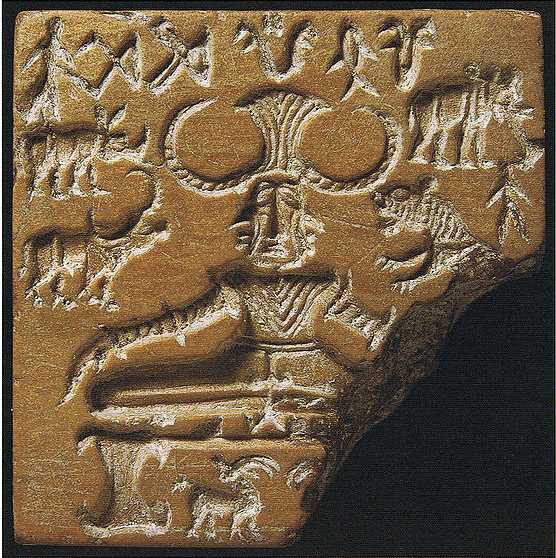
Shiva Seal
Indus Valley Culture
Monday, 21 August
Course Introduction & Orientation
Philosophy as Darśana: The Vision
Wednesday, 23 August
Friday, 25 August
Film: Out of India
Reading (Koller: 1-37)
Week 2: The Vedas
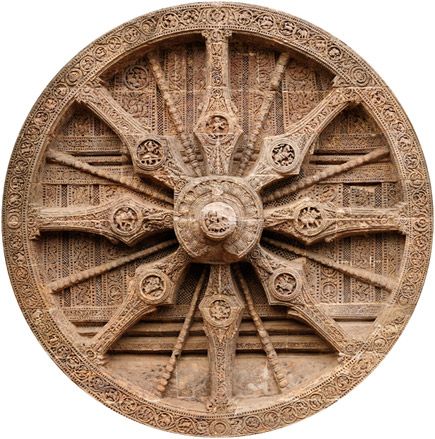
The Great Wheel
Temple to the Surya, the Sun God, at Konark
Monday, 28 August
The Vedas
Hymns to the gods and the importance of sacrificial rites
*August 29: Last day to withdraw from classes without owing tuition*
Wednesday, 30 August
The Vedas
What was Soma?
The Hymn of Creation
Friday, 01 September
Discussion on the Vedas
Reading (Sourcebook 3-36)
(Koller: 38-55)
Week 3: The Upanishads
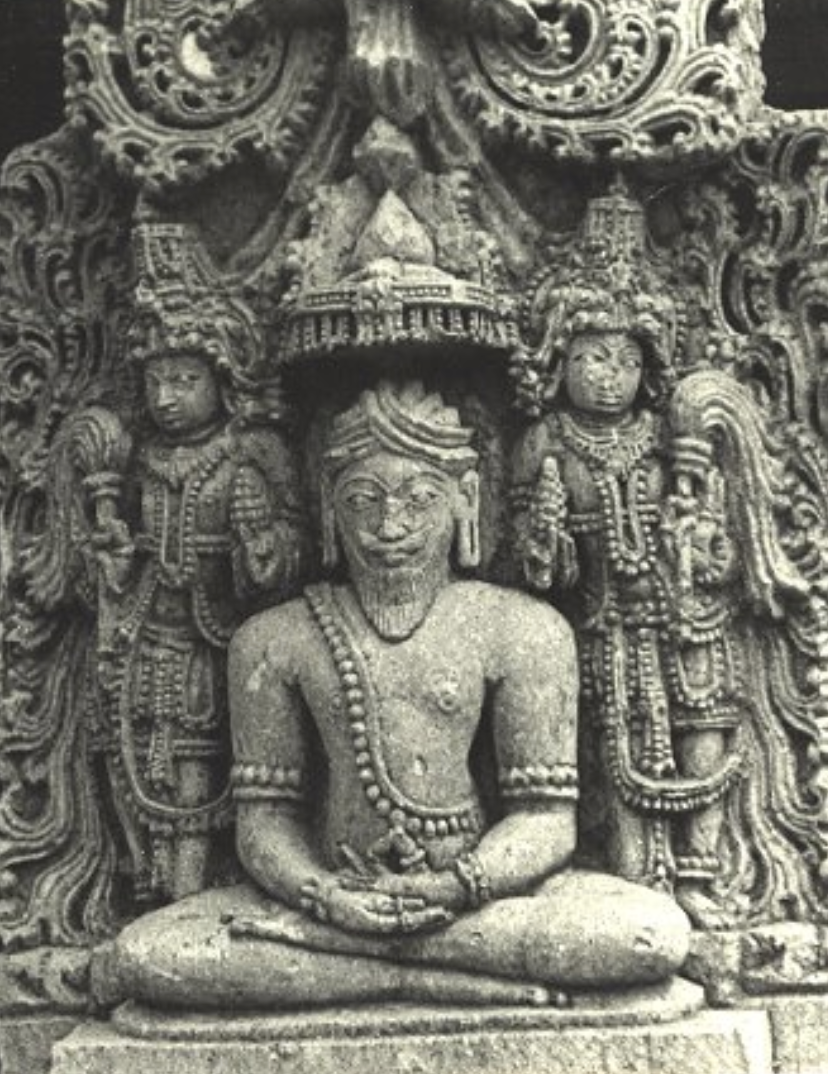
Rishi in Meditation
Hoysala Sculpture
Monday, 04 September
*Holiday—Labor Day*
Wednesday, 06 September
**No Class—PACT Conference in Seattle**
I will upload a video lecture to Laulima
The Upaniṣads
Bṛhadāraṇyaka and Kaṭha Upaniṣads
The Wheel of Saṃsāra and the Teaching of Yoga
Reading (Sourcebook: 37-96)
Koller (56-104)
Key Terms & Questions
Friday, 08 September
**No Class—PACT Conference in Seattle**
Film: Sukhavati
*September 8: Last day to exercise Credit/No Credit
and final deadline to apply for Spring 2023 Graduation*
Week 4: The Upanishads
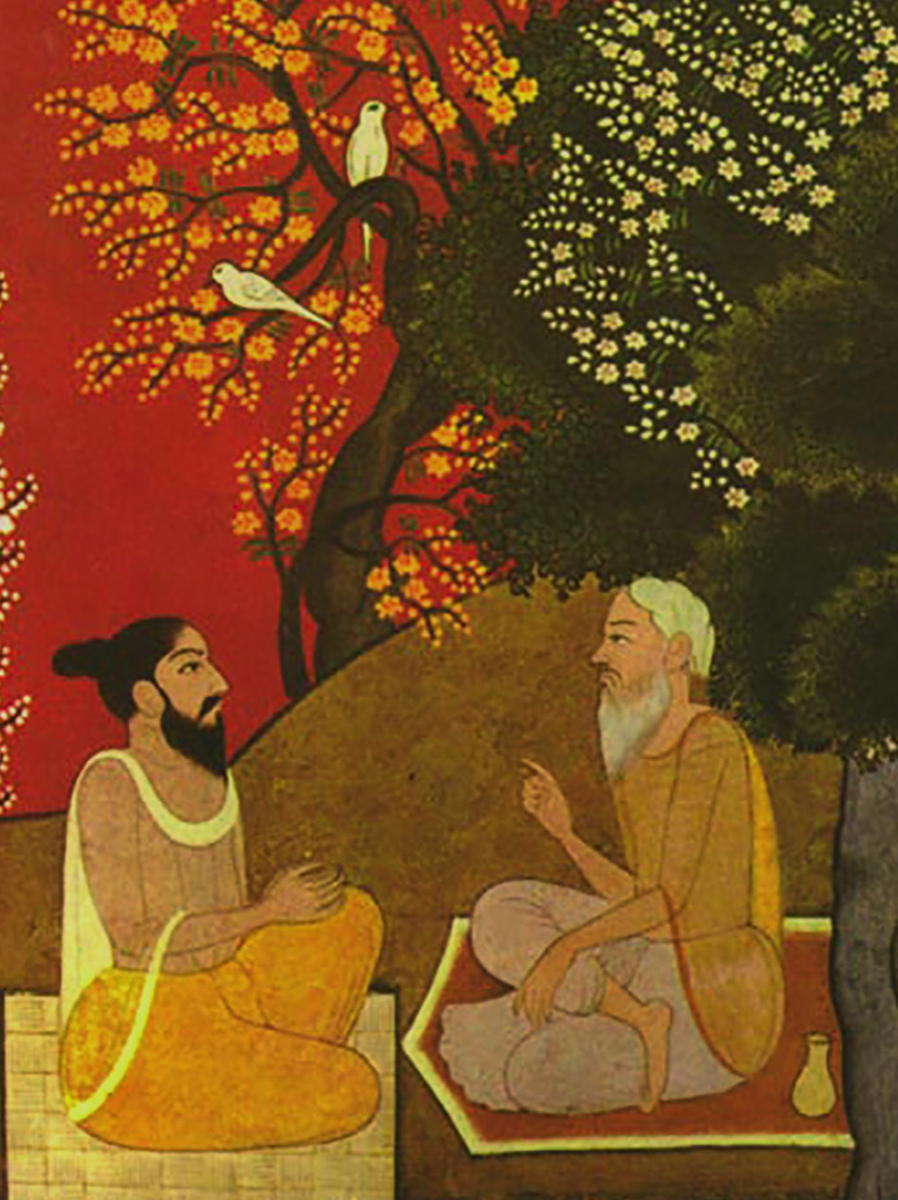
Guru Teaching the Upanishads
Monday, 11 September
The Upaniṣads
Īśa, Kena & Praśna Upaniṣads
*September 12: Last Day to Drop A Class without "W"*
Wednesday, 13 September
The Upaniṣads
Muṇḍaka & Māṇḍūkya Upaniṣads
The Meaning of the Syllable "OM"
Friday, 15 September
Discussion on the Upaniṣads
Reading (Sourcebook: 37-96)
Koller (56-104)
Week 5: Charvaka and Jainism
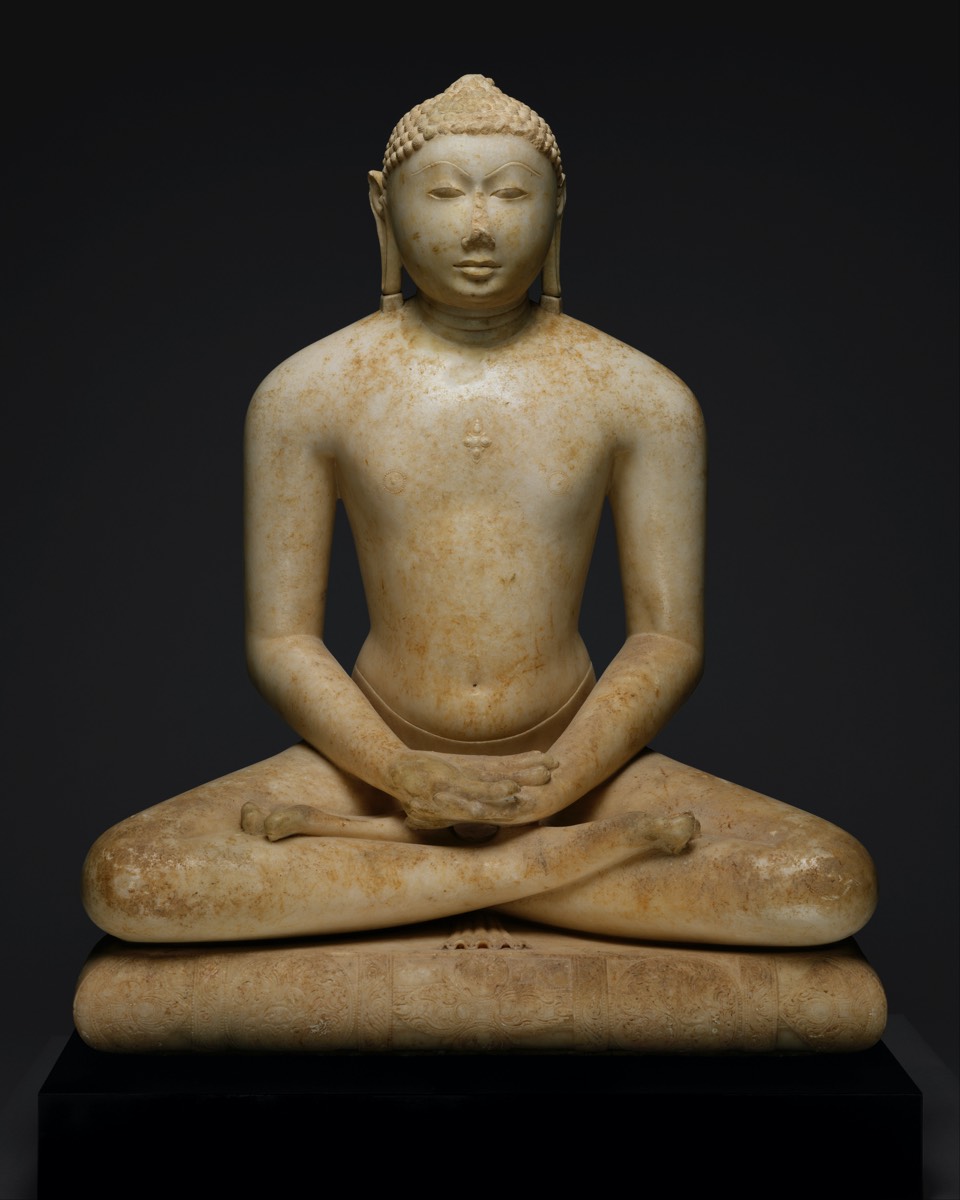
Jain Svetambara Tirthankara in Meditation
India (Gujarat or Rajasthan), 11th c. C.E.
Monday, 18 September
Cārvāka Materialism
Wednesday, 20 September
Friday, 22 September
Discussion on Cārvāka and Jainism
Sourcebook (227-271)
Koller (105-127)
Week 6: Buddhism
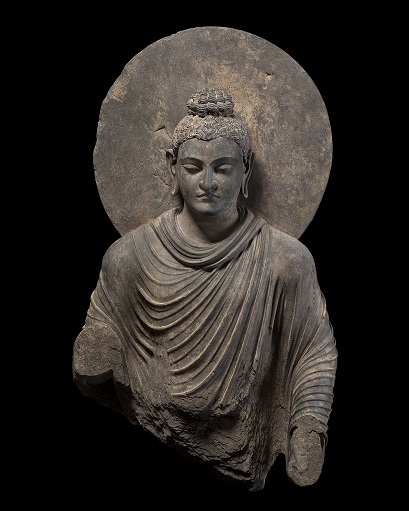
Standing Buddha
Gandhara, 3rd c. C.E.
Monday, 25 September
The Pali Canon
The Story of the Buddha
The Four Noble Truths
The Central Teachings of Buddhism
Film: The Buddha
Wednesday, 27 September
The Pali Canon
The Fire Sermon
Video Selection on the Fire Sermon from the film The Buddha
Buddhist Meditation
Friday, 29 September
Discussion on Buddhism
Sourcebook (272-328)
Koller (128-162)
1st Essay Assignment
(Due Monday, October 9)
PART II: DEVELOPMENT OF INDIAN PHILOSOPHY
Week 7: The Development of Hinduism
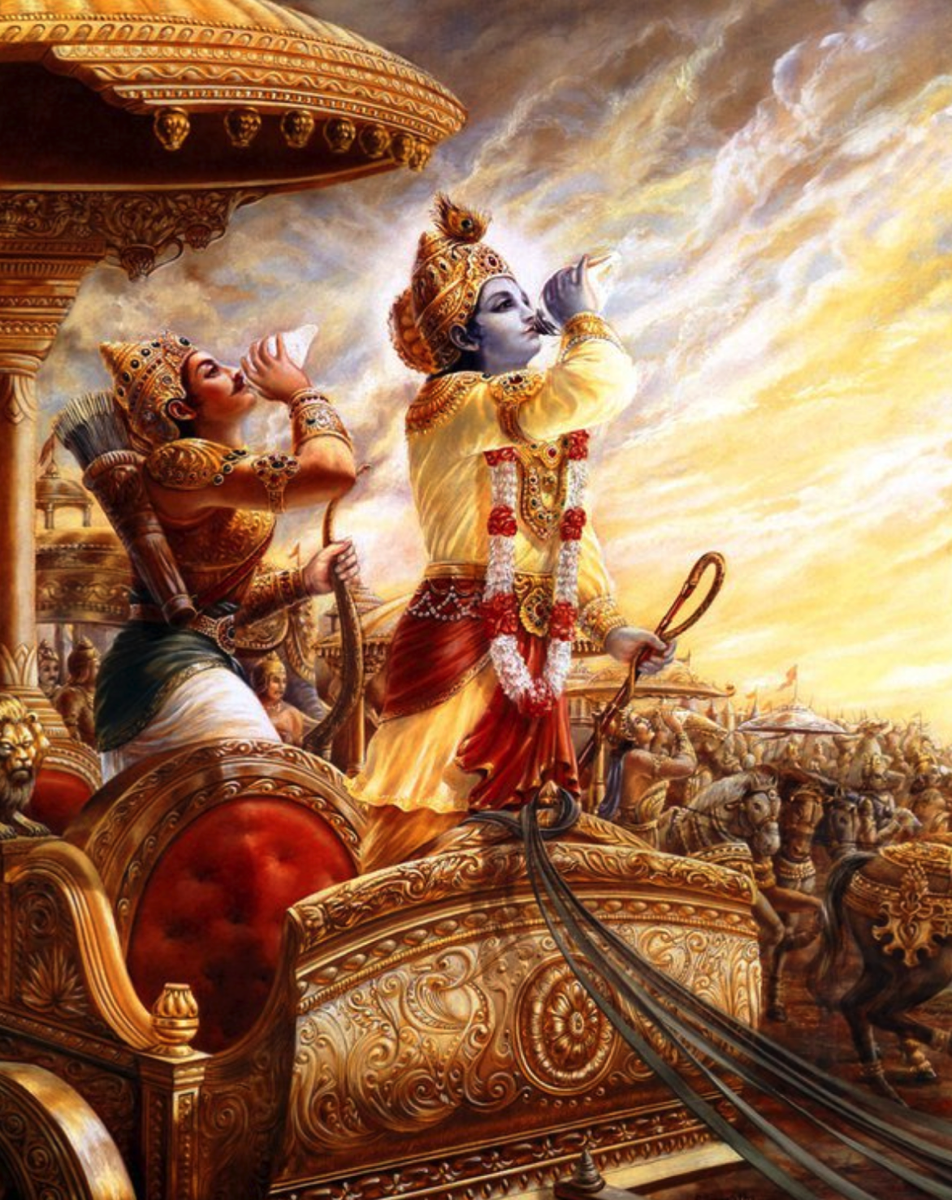
The Blowing of the Conchshells
Arjuna and Krishna on the Field of Dharma
Monday, 02 October
The Bhagavad Gītā
Chapters 1 & 2
The Field of Dharma and the Teaching of Yoga
Wednesday, 04 October
The Bhagavad Gītā
Chapters 3-6
Karma, Jñāna & Rāja Yoga
Friday, 06 October
Discussion on the Bhagavad Gītā
Chapters 1-6
Sourcebook (101-163)
Koller (163-200)
Week 8: The Development of Hinduism
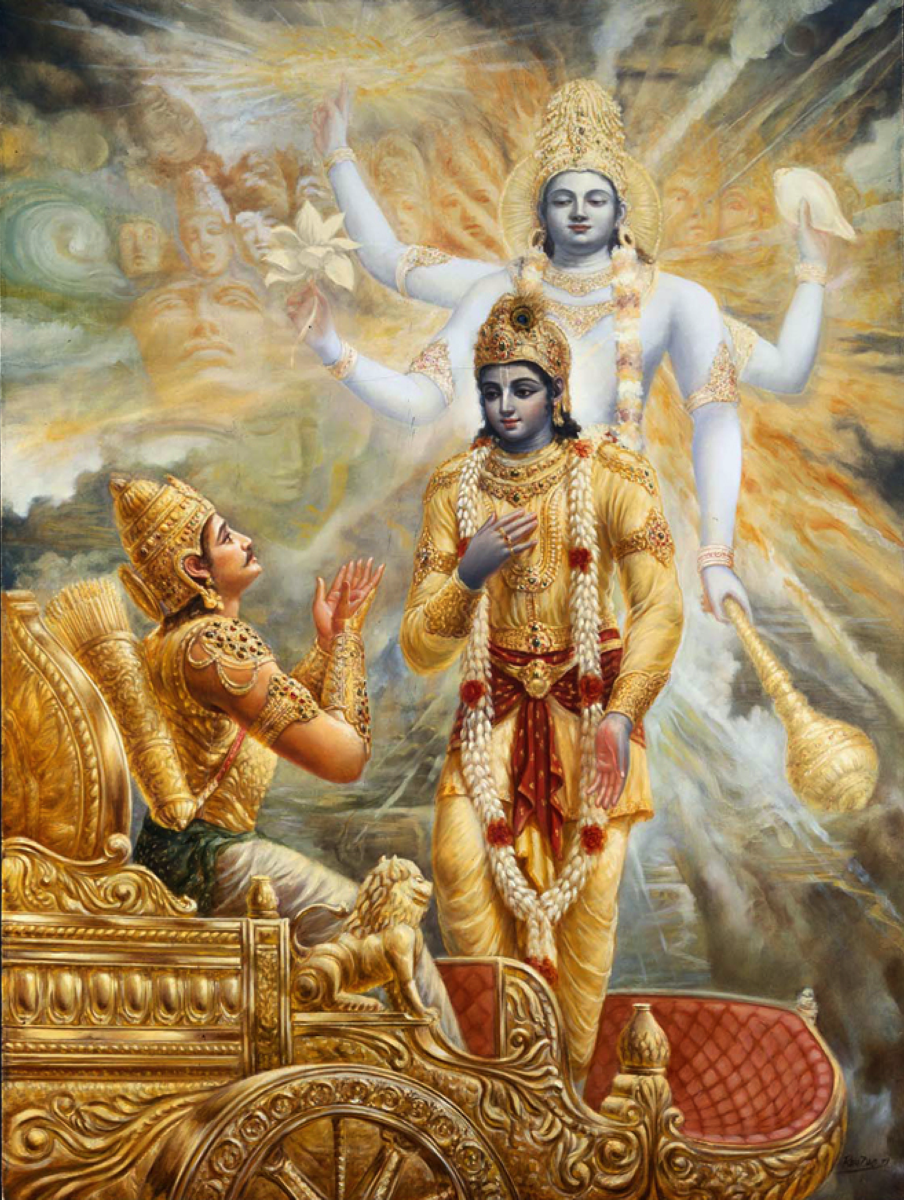
Krishna Reveals his Divine Form to Arjuna
The Teaching of Bhakti Yoga
Monday, 09 October
The Bhagavad Gītā
Chapters 7-12
The Teaching of Bhakti Yoga
Oppenheimer Quote
Wednesday, 11 October
The Bhagavad Gītā
Chapters 13-18
The Teaching of the Three Guṇas
Krishna's Closing Remarks
Friday, 13 October
Discussion on the Bhagavad Gītā
Chapters 7-18
Sourcebook (101-163)
Koller (163-200)
Week 9: The Development of Hinduism
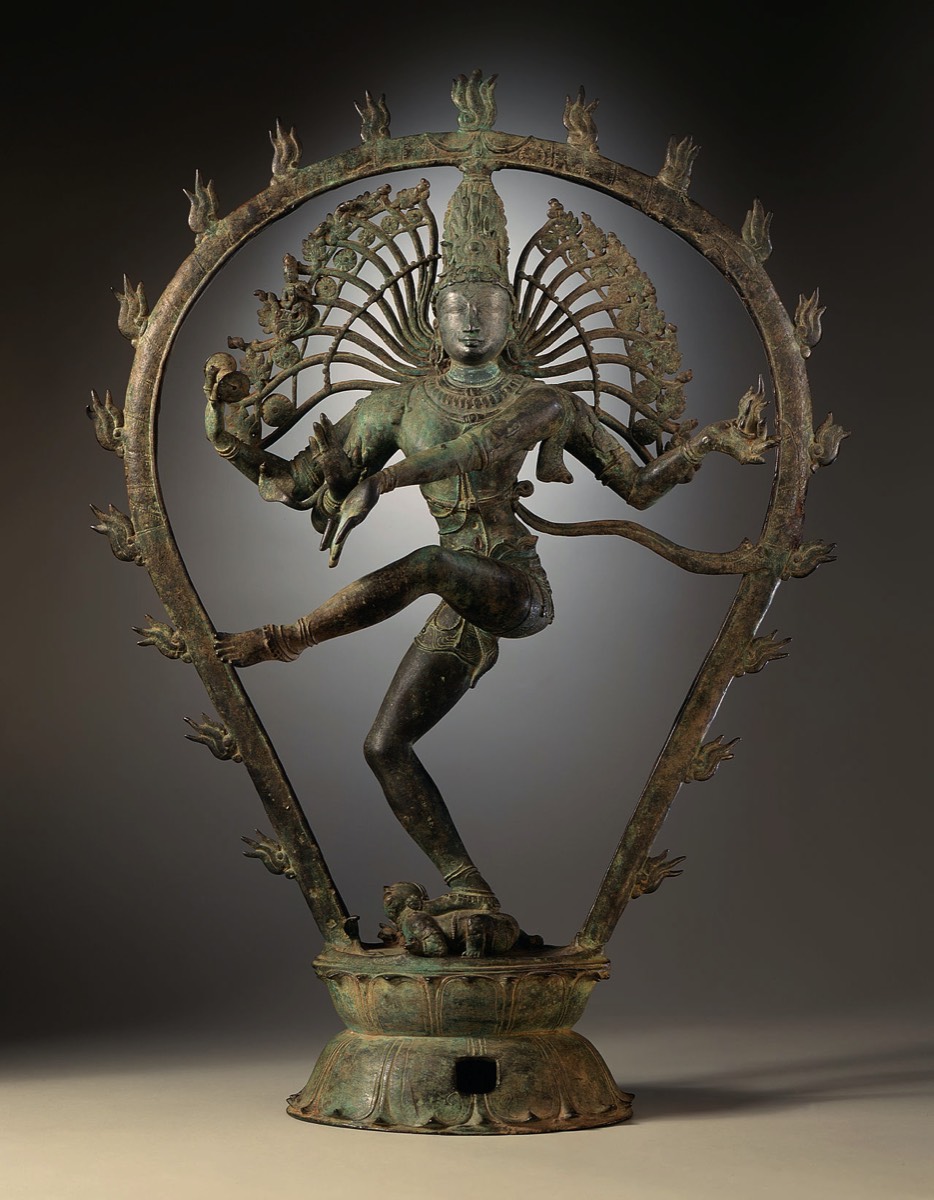
The Lord of the Dance
शिव नटराज
Śiva Naṭarāja
Bronze sculpture, 10th c. C.E.
Monday, 16 October
Wednesday, 18 October
Celebrate Navratri with Linga Bhairavi
The Divine Feminine
Friday, 20 October
The Dance of Shiva
The Manusmṛti (Laws of Manu)
The Arthaśāstra
Discussion on Vaishnavism vs Shaivism
Sourcebook (172-223)
(Koller: 201-240)
Week 10: Mahayana Buddhism
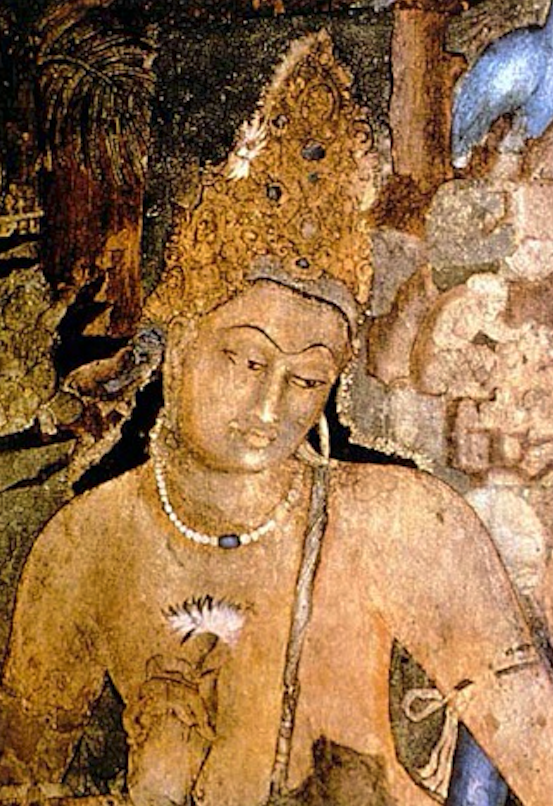
Bodhisattva with Lotus
बोधिसत्त्व पद्मपाणि
Bodhisattva Padmapāṇi
Fresco, Ajanta Caves, India, 5th c.
Monday, 23 October
The Rise of Mahāyāna Buddhism
The Prajñāpāramitā Sūtras
The Heart Sutra
Wednesday, 25 October
The Rise of Mahāyāna Buddhism
The Prajñāpāramitā Sūtras
The Diamond Sutra
Celestial Buddhas and Bodhisattvas
Friday, 27 October
Discussion on Mahāyāna Buddhism
Week 11: Mahayana Buddhism
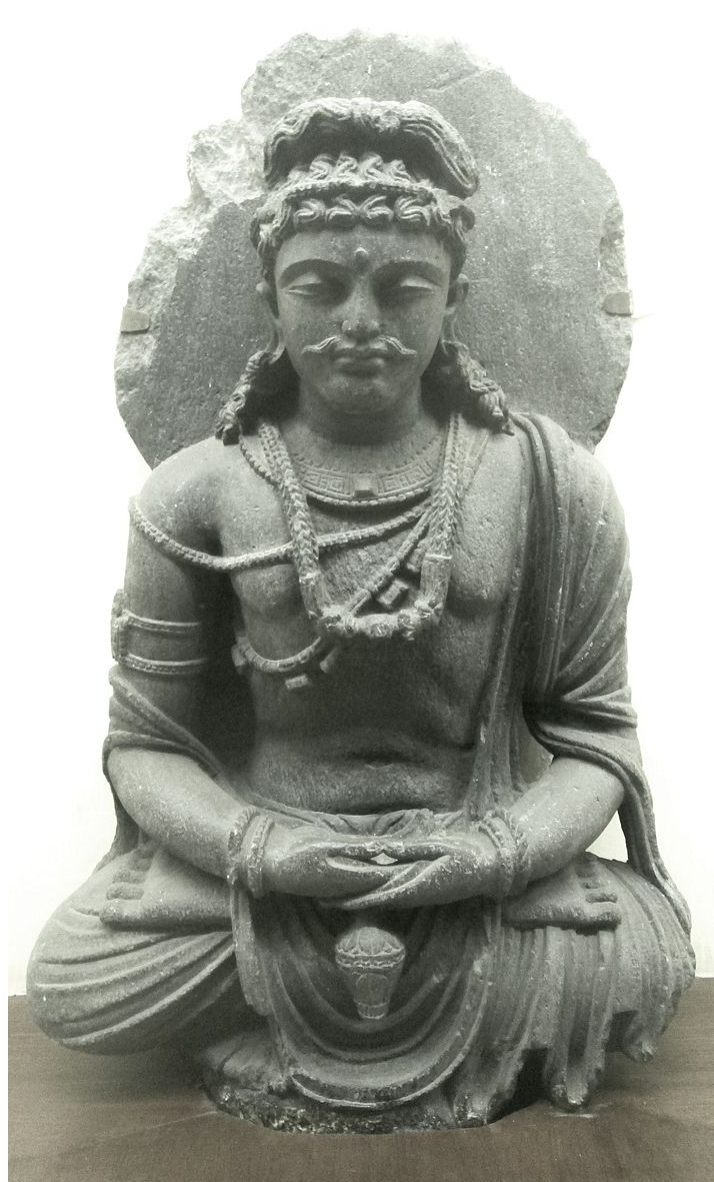
Bodhisattva Maitreya Meditating
Gandhara, 2nd. c. C.E.
Monday, 30 October
The Development of Mahāyāna Buddhism
Nāgārjuna and the Madhyamaka School
Selections from Mūlamadhyamakakārikā
Chapter 24 Text and Commentary
Chapter 25 Text and Commentary
(Sourcebook: 157-162)
(Koller: 328-346)
*October 30: Last Day to Drop A Class Online with "W"*
Wednesday, 01 November
The Development of Mahāyāna Buddhism
Asaṅga and Vasubandhu and the Yogācāra School
Vasubhandu's Triṃśikā-kārikā ('Thirty-Verses)
An alternate translation and commentary
Friday, 03 November
Discussion on Madhyamaka and Yogācāra Buddhism
Schools of Mahayana Buddhism
2nd Essay Assignment
(Due Moday, November 20)
Week 12: Development of Orthodox Schools
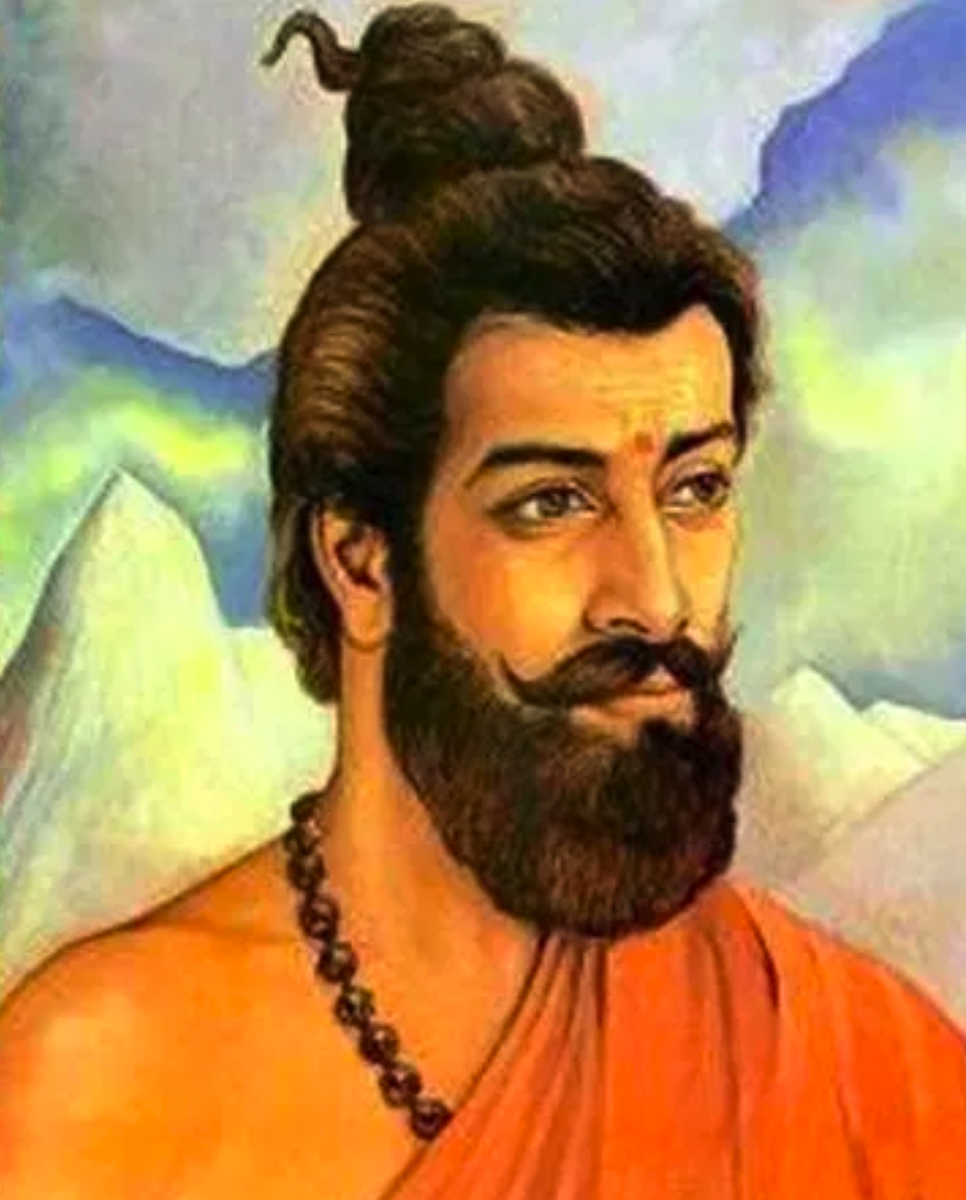
Acharya Kanada
India, 6th-4th c. B.C.E.
Monday, 06 November
The Vaiśeṣika and Nyāya Darśanas
Kaṇāda's Vaiśeṣika Sūtra
Wednesday, 08 November
The Vaiśeṣika and Nyāya Darśanas
Gautama's Nyāya Sūtra
Reading (Sourcebook 349-423))
Koller (265-285)
Friday, 10 November
*Holiday—Veteran's Day*
Week 13: The Development of the Orthodox Schools
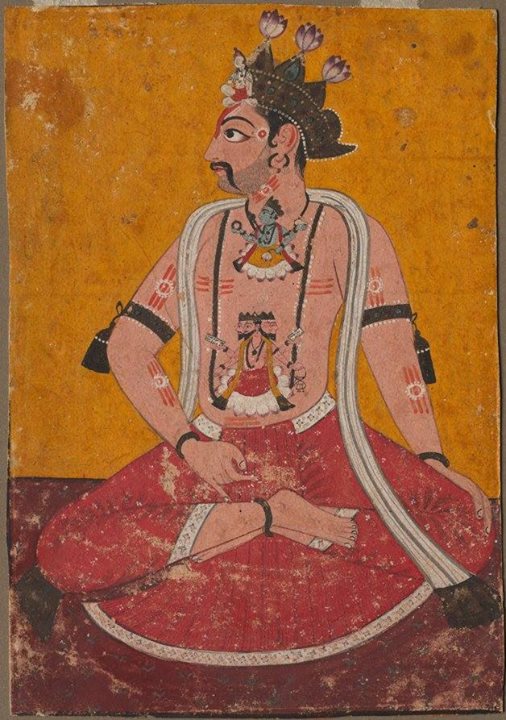
Mandhatri in Yogi Position
India, Pahari, Nurpur, late 17th Century
Monday, 13 November
The Sāṃkhya and Yoga Darśanas
Kapila's Sāṃkhya Sūtra
Wednesday, 15 November
The Sāṃkhya and Yoga Darśanas
The Yoga Sūtras of Patañjali
John Casey's Translation
The Eight Limbs of Yoga
Vibhuti: the Attainments
Friday, 17 November
Discussion on Sāṃkhya and Yoga Darśanas
Week 14: The Development of the Orthodox Schools
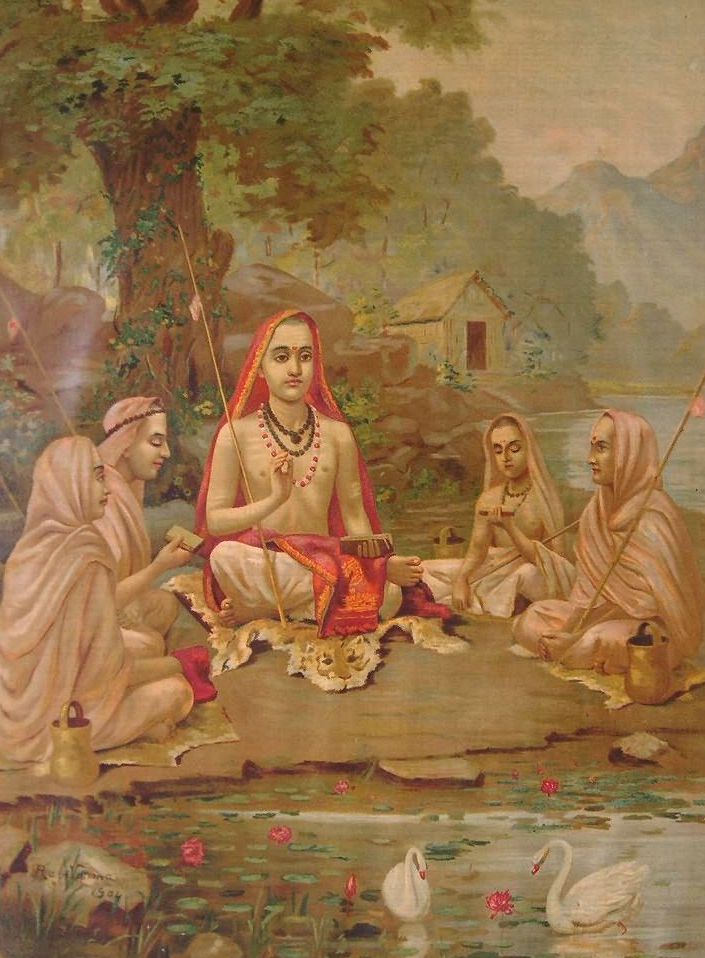
Adi Shankara with Disciples
by Raja Ravi Varma (1904)
Monday, 20 November
The Mīmāṃsā and Vedānta Darśanas
Jamini's Mīmānsā Sutras
Adi Śaṅkarācārya's Advaita Vedānta
Wednesday, 22 November
Vedānta
Adi Śaṅkarācārya's Advaita Vedānta
Friday, 24 November
*Non-Instructional Day*
Week 15: Development of Vedanta
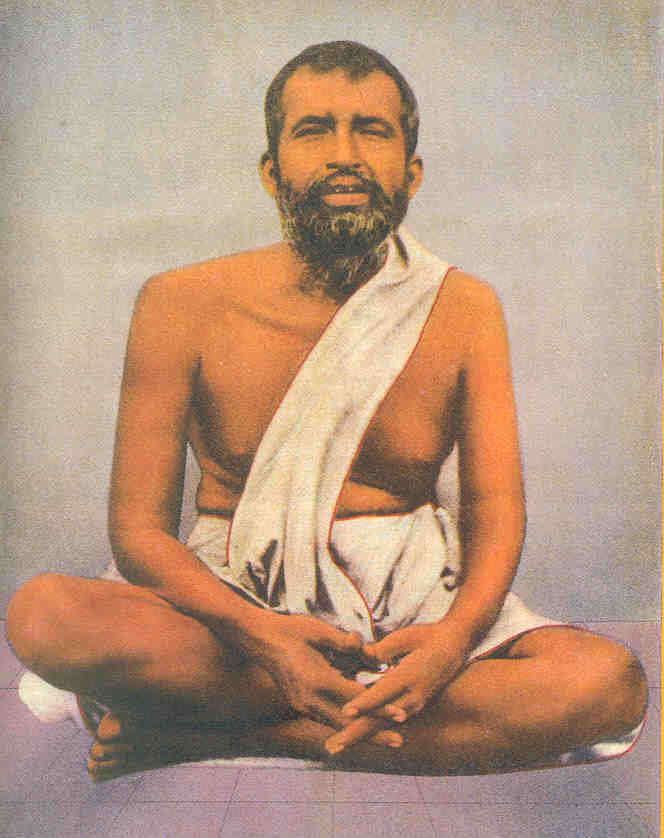
Sri Ramakrishna Paramahansa
1836-1886
Monday, 27 November
Vedānta
Rāmānujā's Viśiṣṭādvaita Vedānta
Madhva's Dvaita Vedānta
Wednesday, 29 November
Renaissance of Indian Philosophy
The Return of Shakti
(On Rāmakrishna, Vivekānda, and Ramana Mararshi)
Friday, 01 December
Discussion on Vedānta Philosophies
Week 16: Final Essay Presentations
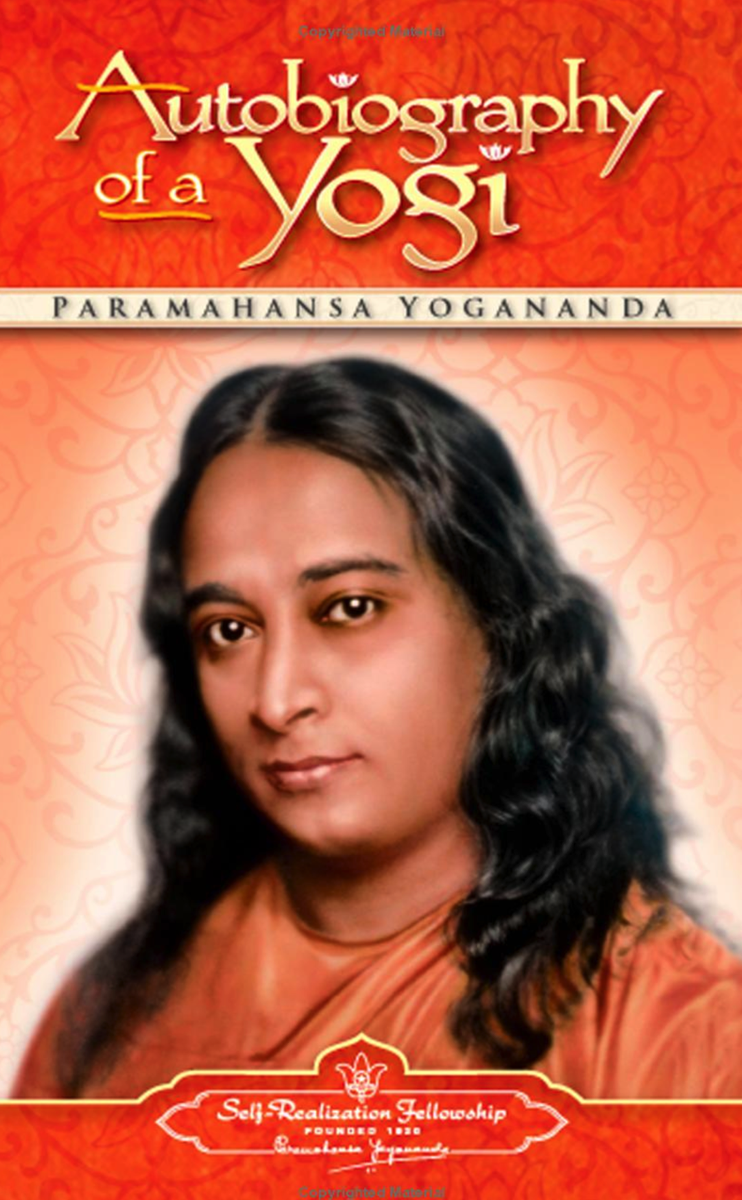
Autobiography of a Yogi
Monday, 04 December
Renaissance of Indian Philosophy
Autobiography of a Yogi
Paramahansa Yogananda
Film: Awake: The Life of Yogananda
Wednesday, 06 December
Discussion
Final Term Paper Assignment
(Due Monday, December 11, 1:50 PM)
Final Exam
Monday, 11 December (11:50 AM –1:50 PM)
**Schedule is subject to revision**
